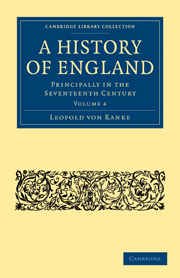Book contents
- Frontmatter
- Contents
- BOOK XVI THE LATER YEARS OF CHARLES II, 1675—1685 WHIGS AND TORIES
- INTRODUCTION
- CHAP. I Parliament in 1675. Formation of new parties
- CHAP. II The fourteen months' prorogation. Parliamentary Session of 1677
- CHAP. III Dynastic and political alliance of Charles II with the Prince of Orange
- CHAP. IV Complications at the conclusion of the Peace of Nimuegen. Alliance of Louis XIV with the Parliamentary opposition in England
- CHAP. V Denunciation of a Jesuit conspiracy. Last Session of the Parliament of the Restoration
- CHAP. VI Parliament of 1679
- CHAP. VII Parliamentary interim, 1679, 1680
- CHAP. VIII The Parliamentary Session of 1680
- CHAP. IX Parliament at Oxford, March 1680, 1681
- CHAP. X Antagonism of the Prince of Orange and the Duke of York
- CHAP. XI Reaction against the Whigs. Rye-House Plot. Execution of Lord William Russell
- CHAP. XII End of Charles II's Government
- BOOK XVII REIGN OF JAMES II, FEBRUARY 1685 TO SEPTEMBER 1688
- BOOK XVIII THE FALL OF JAMES II IN ITS CONNEXION WITH THE EUROPEAN CONFLICTS WHICH MARKED THE CLOSE OF 1688
- BOOK XIX COMPLETION OF THE REVOLUTION IN THE THREE KINGDOMS, 1688—1691
CHAP. IX - Parliament at Oxford, March 1680, 1681
Published online by Cambridge University Press: 07 September 2011
- Frontmatter
- Contents
- BOOK XVI THE LATER YEARS OF CHARLES II, 1675—1685 WHIGS AND TORIES
- INTRODUCTION
- CHAP. I Parliament in 1675. Formation of new parties
- CHAP. II The fourteen months' prorogation. Parliamentary Session of 1677
- CHAP. III Dynastic and political alliance of Charles II with the Prince of Orange
- CHAP. IV Complications at the conclusion of the Peace of Nimuegen. Alliance of Louis XIV with the Parliamentary opposition in England
- CHAP. V Denunciation of a Jesuit conspiracy. Last Session of the Parliament of the Restoration
- CHAP. VI Parliament of 1679
- CHAP. VII Parliamentary interim, 1679, 1680
- CHAP. VIII The Parliamentary Session of 1680
- CHAP. IX Parliament at Oxford, March 1680, 1681
- CHAP. X Antagonism of the Prince of Orange and the Duke of York
- CHAP. XI Reaction against the Whigs. Rye-House Plot. Execution of Lord William Russell
- CHAP. XII End of Charles II's Government
- BOOK XVII REIGN OF JAMES II, FEBRUARY 1685 TO SEPTEMBER 1688
- BOOK XVIII THE FALL OF JAMES II IN ITS CONNEXION WITH THE EUROPEAN CONFLICTS WHICH MARKED THE CLOSE OF 1688
- BOOK XIX COMPLETION OF THE REVOLUTION IN THE THREE KINGDOMS, 1688—1691
Summary
In the midst of these commotions the party names of Whig and Tory arose in England.
The former had been heard in Scotland since the rising in Edinburgh in 1648, which bears the name of the Whiggamore raid. It is worth while to notice the party to which this name was originally applied. It was the party which rejected the agreement that had been made between the moderate Presbyterians and Charles I,—a party of zealous Covenanting views, but in no way of republican tendency. It had contributed sensibly to the victory of Cromwell and the Commonwealth, but did not, on that account, approve in any way of their conduct towards the King. It adhered to the old Scottish combination of the idea of national sovereignty with that of hereditary monarchy. Doubtless, in Scotland also, the republican tendencies appeared; for instance, in October 1680, the King and the Duke were excommunicated with due form; a manifesto was issued, which rejected all authority not proceeding from election, which refused to recognise church law, feudal law, or even the Parliament, and revived the idea that men were bound to live according to the law of the people of Israel, which God himself had given. These were, however, rather Anabaptist than Presbyterian views; their adherents were indeed called Whigs, but ‘wild Whigs.’
In the same way there was great talk of ‘the wild Irish’ in the north of Ireland, who had always been called Tories, amongst whom at that time an Irish Scanderbeg, by name O'Hanlon, was prominent on account of his rash, courageous, and fortunate enterprises: he was shot in April 1681.
- Type
- Chapter
- Information
- A History of EnglandPrincipally in the Seventeenth Century, pp. 121 - 136Publisher: Cambridge University PressPrint publication year: 2010First published in: 1875



